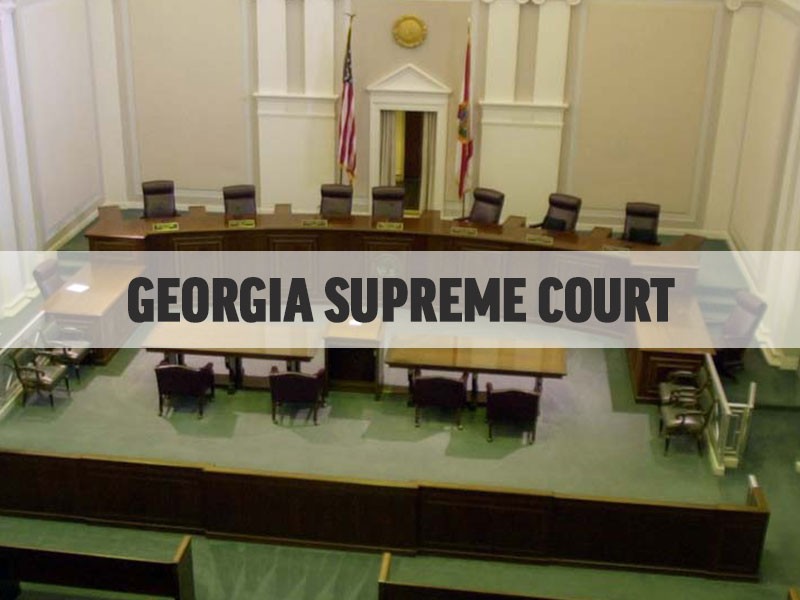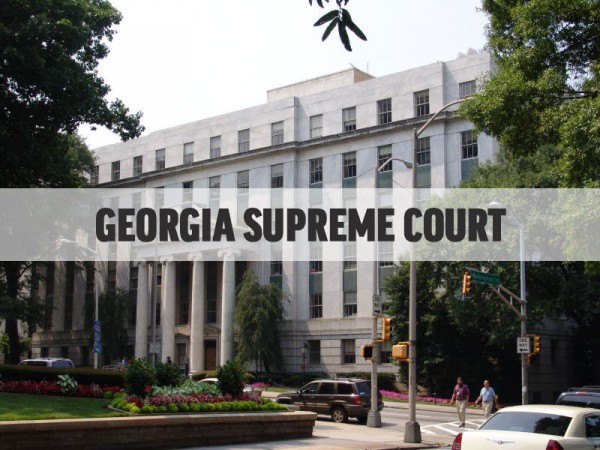In an ongoing feud between Lake Lanier neighbors over a variety of complaints, including one couple’s claim that the other couple intentionally hung wind chimes near their property to harass them, the Georgia Supreme Court has thrown out a Hall County court judgment and is sending the case back to the lower court to dismiss it.
In today’s 7-to-2 ruling, written by Justice Carol Hunstein, the majority has concluded that the couple who sued lacked “standing” – or the legal right – to bring the lawsuit, in which they claimed that Georgia’s “good behavior bond statute” is unconstitutional, because they could not show that they’d suffered any harm as a result of the statute.
As a result, “we do not reach the constitutional question posed in this case because the complaining party lacks standing to pursue such a challenge,” the majority opinion says. “Accordingly, we vacated the judgment of the trial court and remand this matter with direction that the court dismiss the complaint for relief.”
According to briefs filed in the case, Andrew and Penny Leeuwenburg and Ken and Rochelle Parker are next-door neighbors whose properties on Woodlake Drive in Gainesville border Lake Lanier. The two married couples have been embroiled in conflict for several years, with each couple charging the other with harassment and wrongdoing. Three times, the Leeuwenburgs have gone to the Hall County Magistrate Court in an effort to obtain “Good Behavior Bonds” against the Parkers.
Under the state’s Good Behavior Bond statute (Georgia Code § 17-6-90), a judge may “issue a notice to appear for a show cause hearing to any person whose conduct in the county is sufficient to justify the belief that the safety of any one or more persons in the county or the peace or property of the same is in danger of being injured or disturbed thereby.” A hearing must be held within seven days from the time the persons requesting the bond submit an application. Under the law, if “sufficient cause” is shown, “the court may require from the person a bond with sureties for such person’s good behavior with reasonable conditions to ensure the safety of persons or property in the county or the preservation of the peace of the county for a period of up to six months.” Under the statute, the judge may have the person arrested if the allegations of the person’s conduct are “sufficient to justify the belief that there is imminent danger of injury to any person in the county, damage to any property in the county, or disturbance of the peace of the county.” The purpose of the conditional “Good Behavior Bonds” is to prevent the commission of a crime and to avoid having people arrested and charged with crimes when the conflict at issue may be temporary and can be adequately dealt with by the issuance of a court order that governs the person’s conduct for up to 12 months.
In January 2015, the Leeuwenburgs filed a motion asking the court to reissue a third bond against the Parkers, “to preserve the peace and goodwill,” after an apparent truce between the couples had dissolved. In their motion, the Leeuwenburgs wrote that the Parkers had installed “a large number of wind chimes” as close as possible to the Leeuwenburgs’ property, as well as “a decoration shaped like a cannon” aimed at their property. The Leeuwenburgs said they had “extreme sensitivity to noise.” And, according to briefs filed in the case, they said the installation of the noise-making items “is quite odd,” since the vast majority of the Parkers’ complaints against them had been that the Leeuwenburgs “cause too much noise (dogs, music, etc.)” They also complained that the Parkers had installed security cameras aimed directly at their property and that their photographing and videotaping of the Leeuwenburgs’ activities was the “proverbial ‘final straw.’” And they complained that the Parkers had hired a tree-cutting service to trim branches but only trees whose branches fell into the Leeuwenburgs’ property were trimmed. Finally, the Leeuwenburgs claimed that one night, at 1:00 a.m., Ken Parker stood outside with a strong-beam flashlight aimed directly into their bedroom, causing them to lose sleep. In response to the Leeuwenburgs’ complaints, the judge issued a Good Behavior Bond that prohibited the couples from having any contact with each other, from going onto each other’s property or dock, from calling 911 “unless there is a true, verifiable emergency at that time,” from contacting the Army Corps of Engineers “concerning the other party’s activities on Corps property,” and from photographing or videotaping each other.
In June 2015, the Parkers sued the Leeuwenburgs, asking the court to declare § 17-6-90 unconstitutional and prohibit the Leeuwenburgs from ever seeking another Good Behavior Bond against them. In February 2016, the trial court ruled against the Parkers, finding that the statute was constitutional and that the Leeuwenburgs and others were “entitled to avail themselves of the relief provided by said statute.” The Parkers then appealed to the highest court of the state.
In response, the Leeuwenburgs argued that the Parkers lacked standing to make a legal claim in court. “We agree,” today’s majority opinion says.
“As a general rule, a litigant has standing to challenge the constitutionality of a law only if the law has an adverse impact on that litigant’s own rights,” the majority opinion says, quoting its 2007 decision in Feminist Women’s Health Center v. Burgess. “As a prerequisite to attacking the constitutionality of a statute, the complaining party must show that it is hurtful to the attacker.”
Here, the Parkers “have neither been arrested nor have they been threatened with arrest in relation to the bond proceedings associated with this matter,” today’s majority opinion says. Therefore, they lack standing to challenge the statute’s subsection that refers to possible arrest. And “even if this Court were to accept that Appellees [i.e. the Leeuwenburgs] may initiate future peace bond proceedings, Appellants’ [i.e. the Parkers’] complaint lacks any allegation that a judicial officer in Hall County would exercise its authority and initiate such proceedings,” the majority opinion says. “In effect, Appellants currently stand in the same position as other Hall County citizens who might, at some time in the future, be subject to the judicial procedure envisioned in § 17-6-90 (a).”
Because the Parkers lacked standing to bring this constitutional challenge, the trial court erred in ruling on the matter. “Accordingly, we vacate the judgment of the trial court and remand this matter with direction that the court dismiss the complaint for relief.”
(Three justices concurred with the judgment only in this opinion, and two dissented.)
In the dissent, Justice Nels Peterson argues that “the Parkers’ case is properly before us. The statute they challenge as unconstitutional has been enforced against them three times already, and the Parkers have shown they face a credible threat that it will be enforced against them in the future. Under well-established precedent, that means they have standing to bring at least some of their claims.”
“The threat of future injury in this case is substantial and strikingly different from the alleged injury” in the Georgia Supreme Court’s 2009 decision in Manlove v. Unified Government of Athens-Clarke County, which the Leeuwenburgs argue is the controlling decision in this case. “Here, of course, the Parkers have been subjected to the statute’s provisions multiple times in the past, and the Leeuwenburgs have threatened to invoke the statute again in the future if the Parkers act as they wish.” Even the Eleventh Circuit acknowledged that a past injury may establish “a sufficient imminence of future harm” when the “future injury would likely occur in substantially the same manner as the previous injury.”
“Given the Leeuwenburgs’ past practice of seeking good behavior bonds against the Parkers (and success in having them granted), including for the Parkers’ use of security cameras, combined with the Leeuwenburgs’ threat to continue this practice, there is a credible threat that subsection (a) will be applied against the Parkers in the near future if they act as they wish,” says the dissent, which is joined by Justice Harold Melton.
















